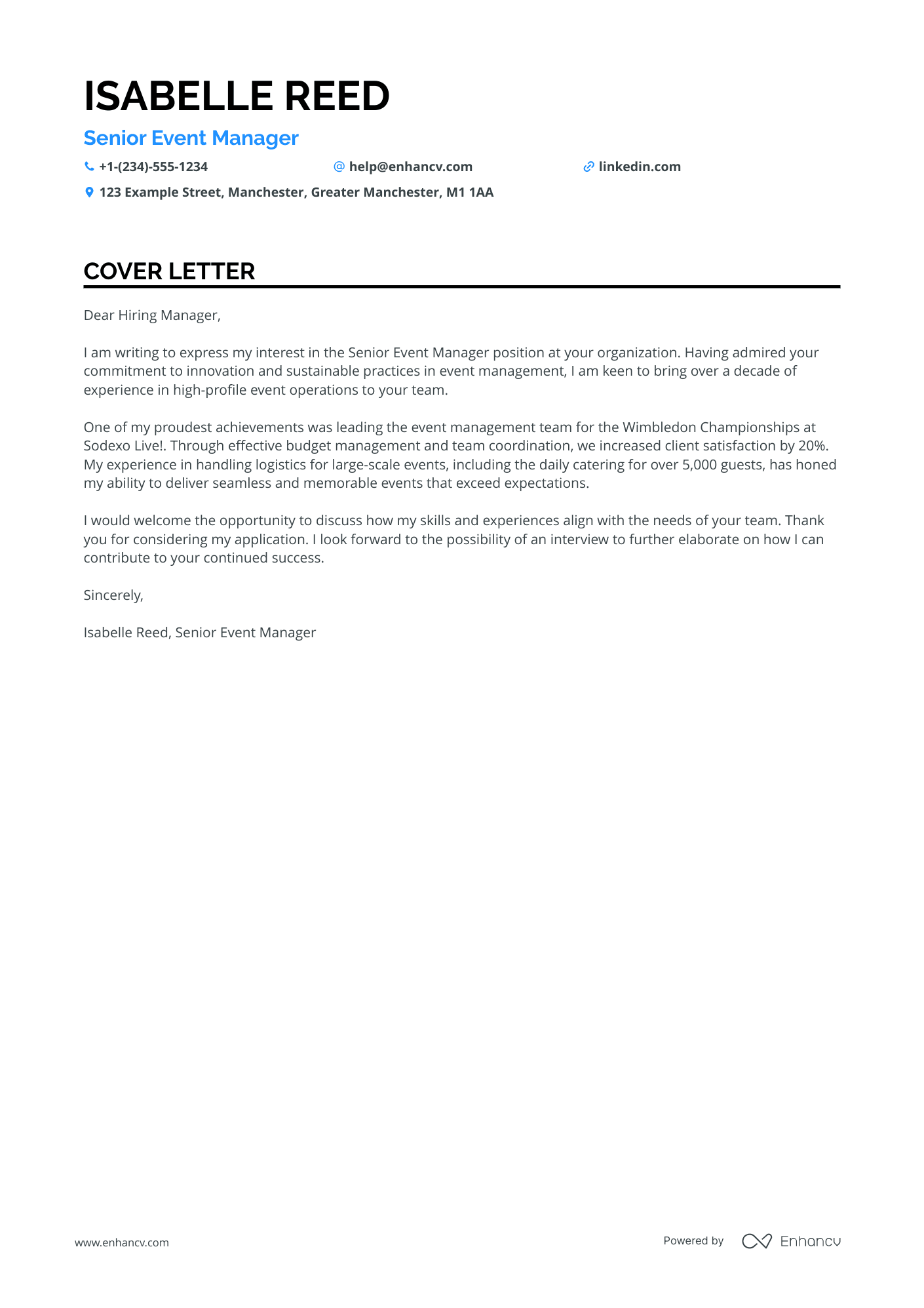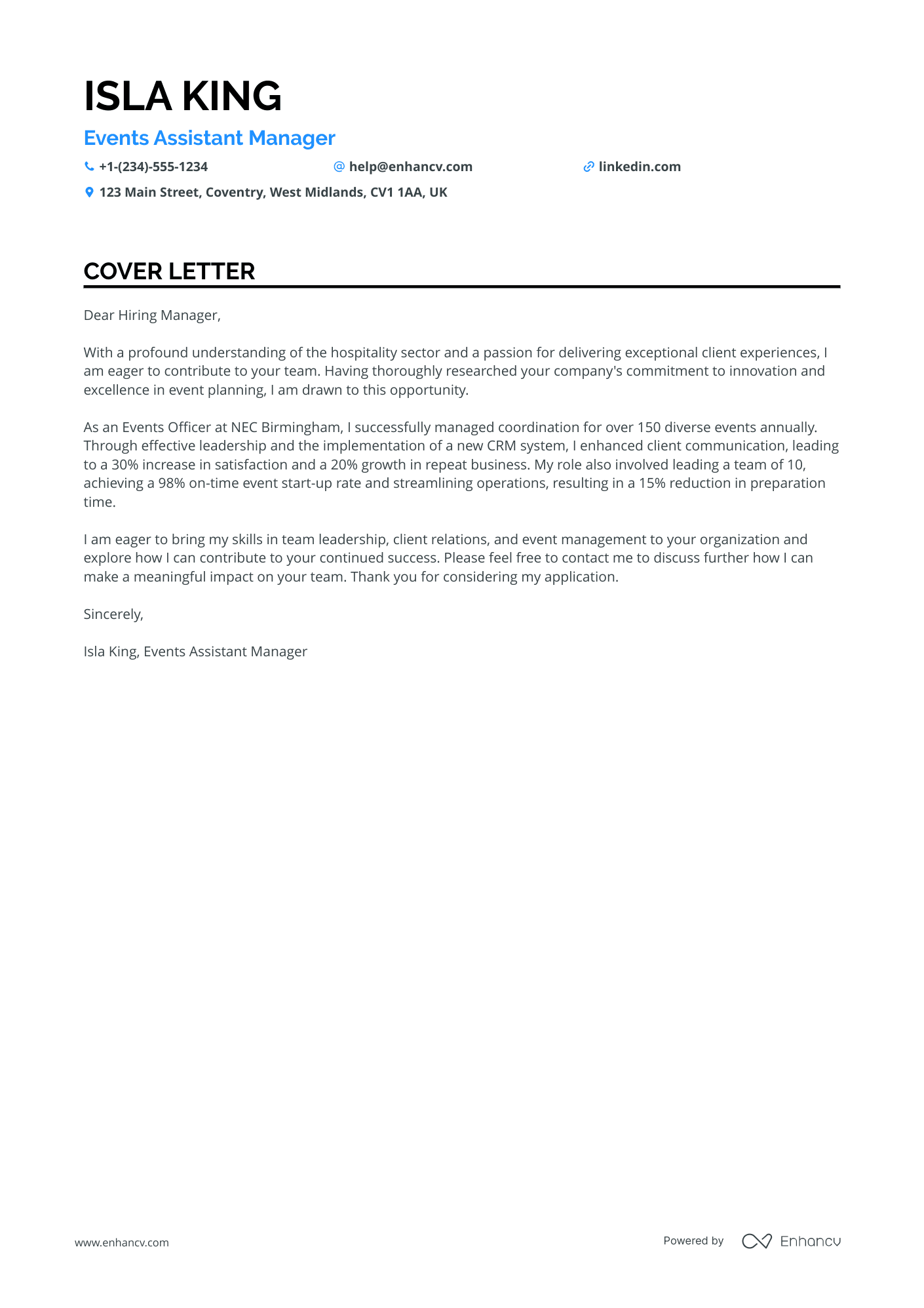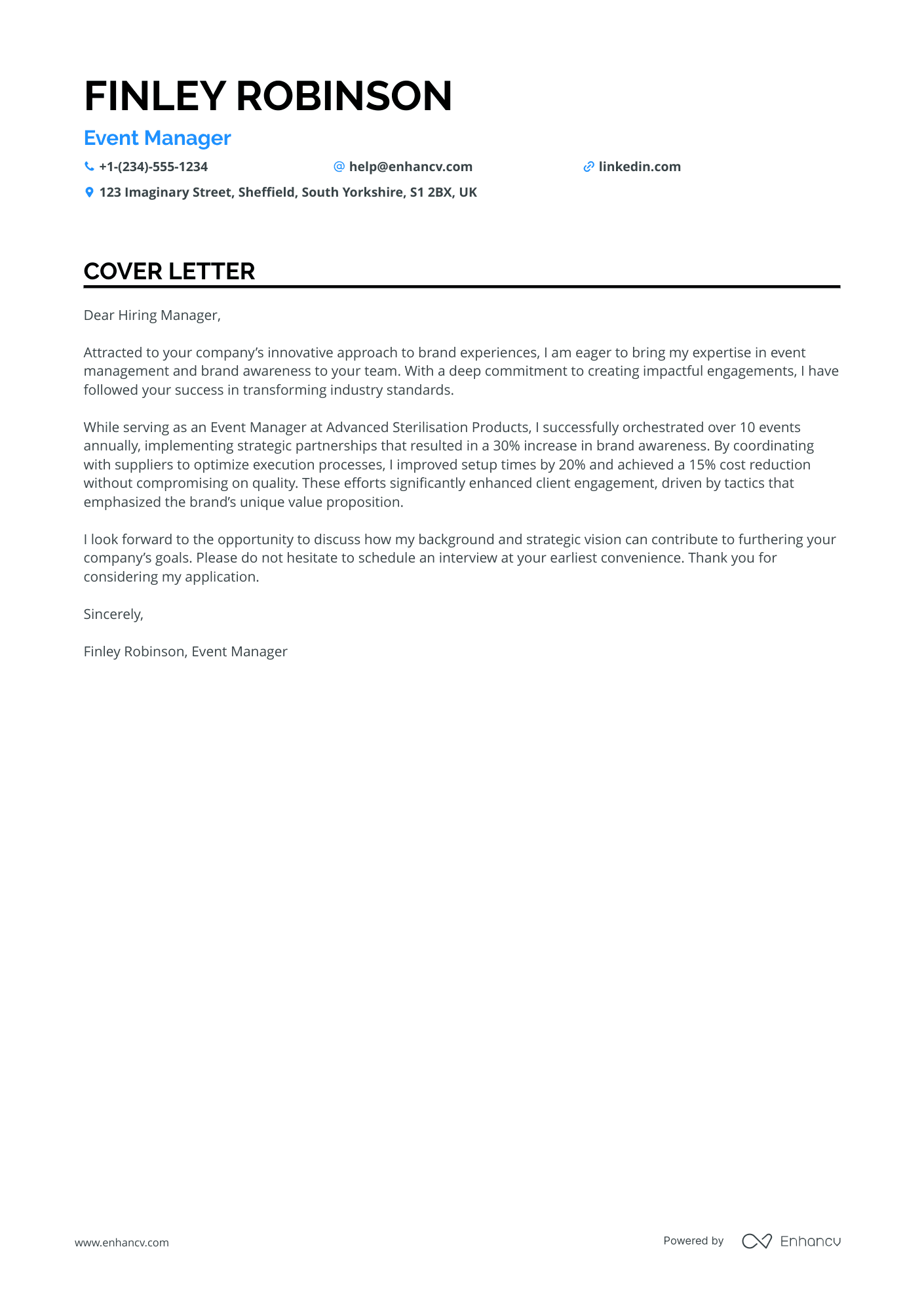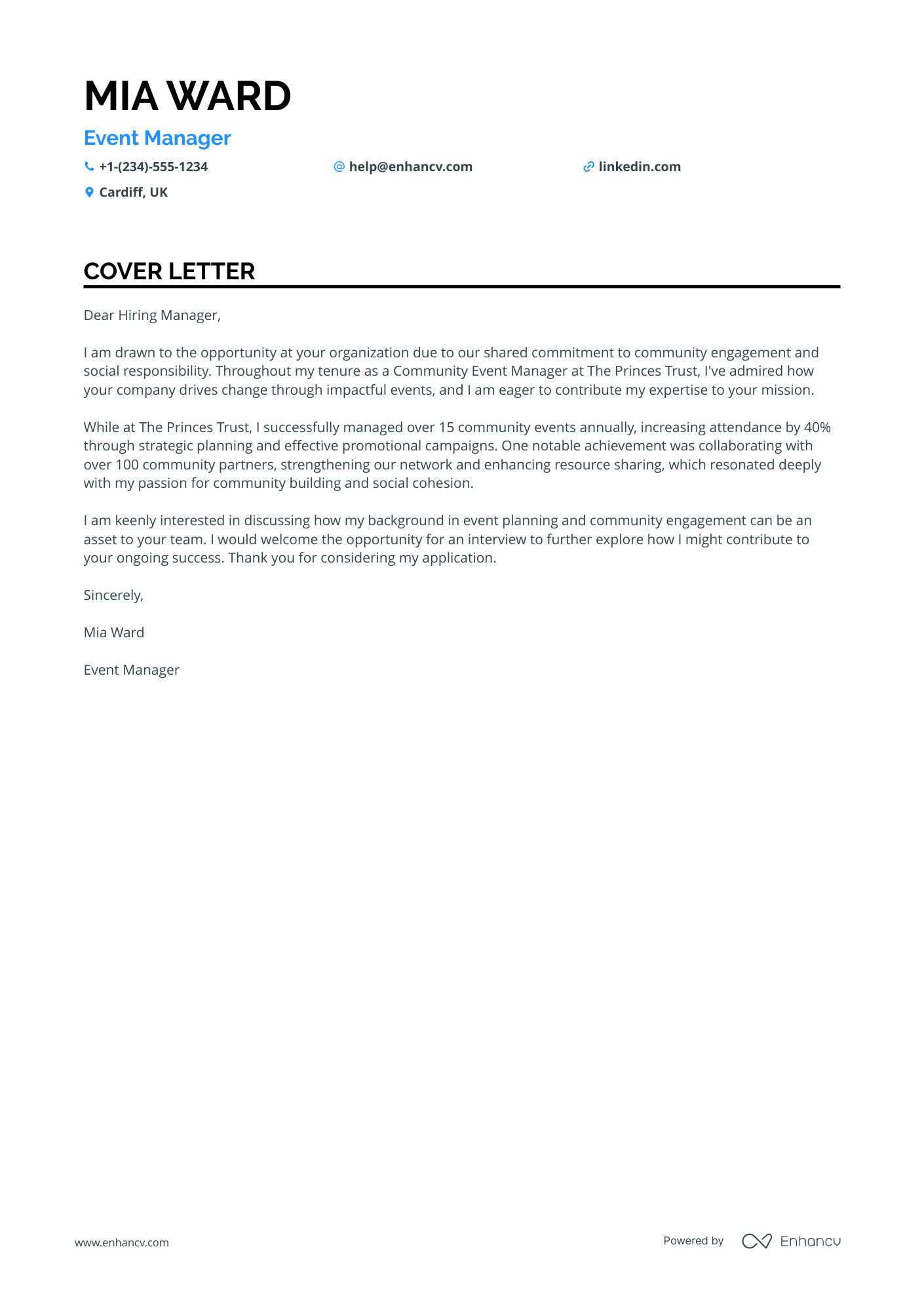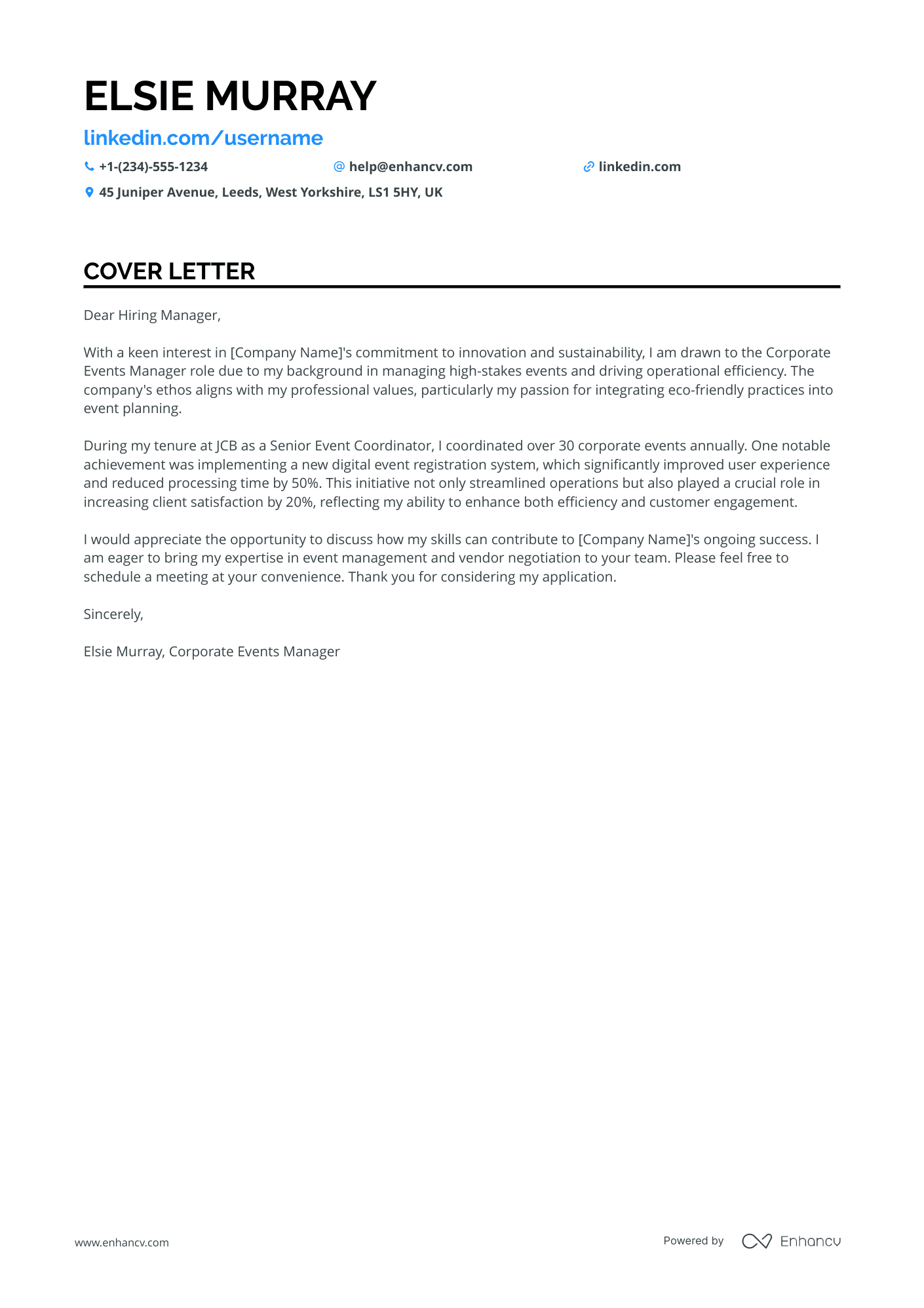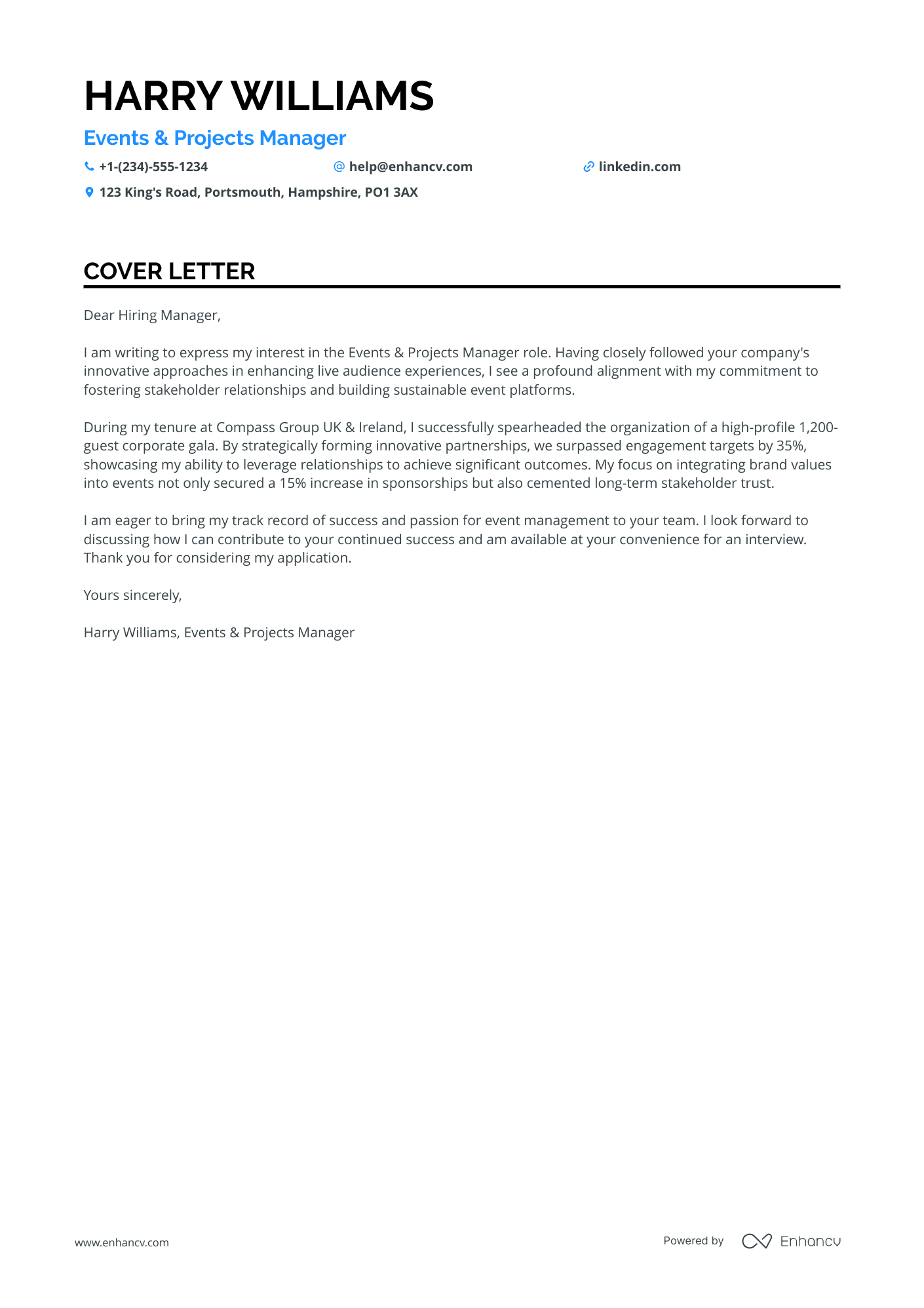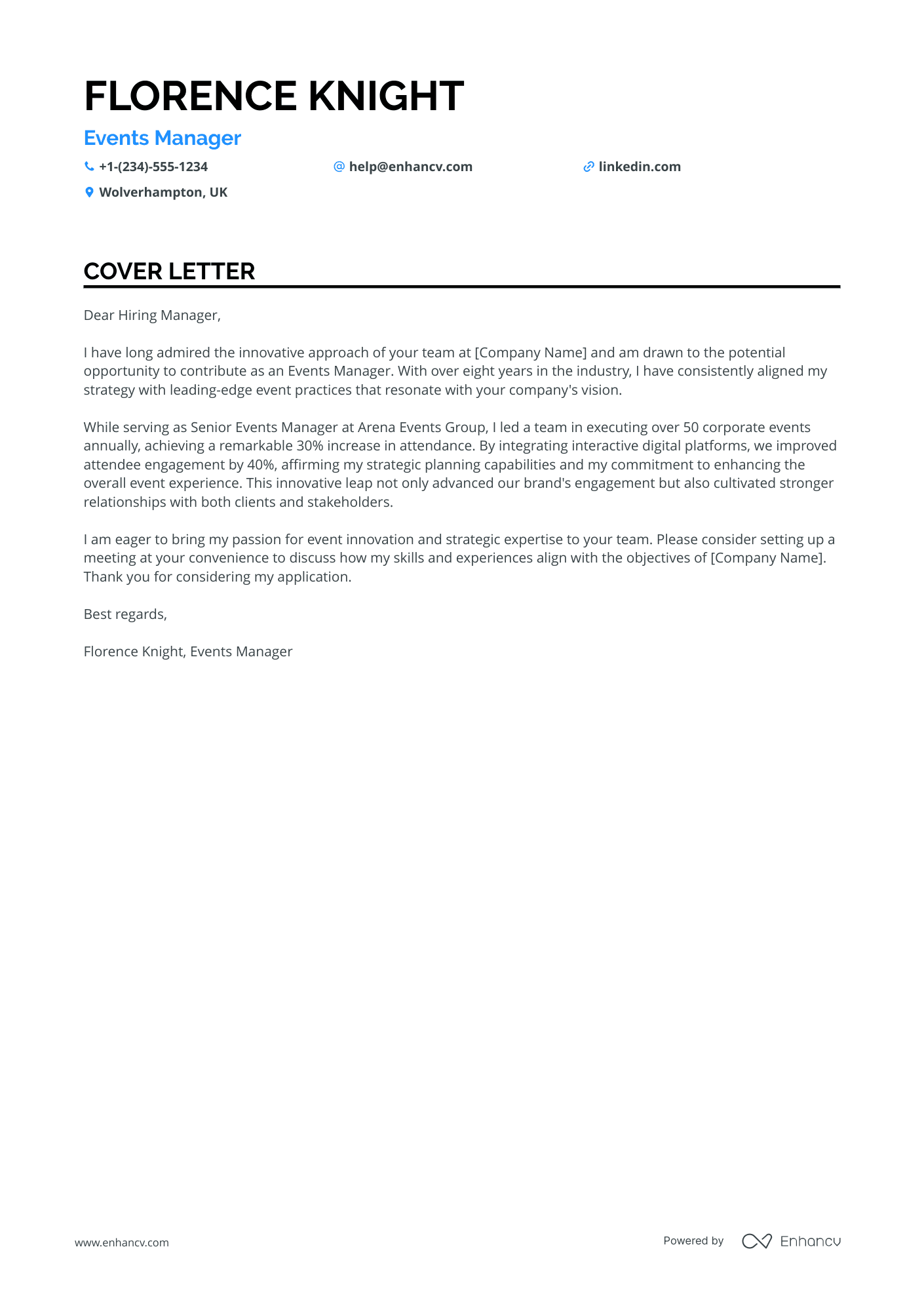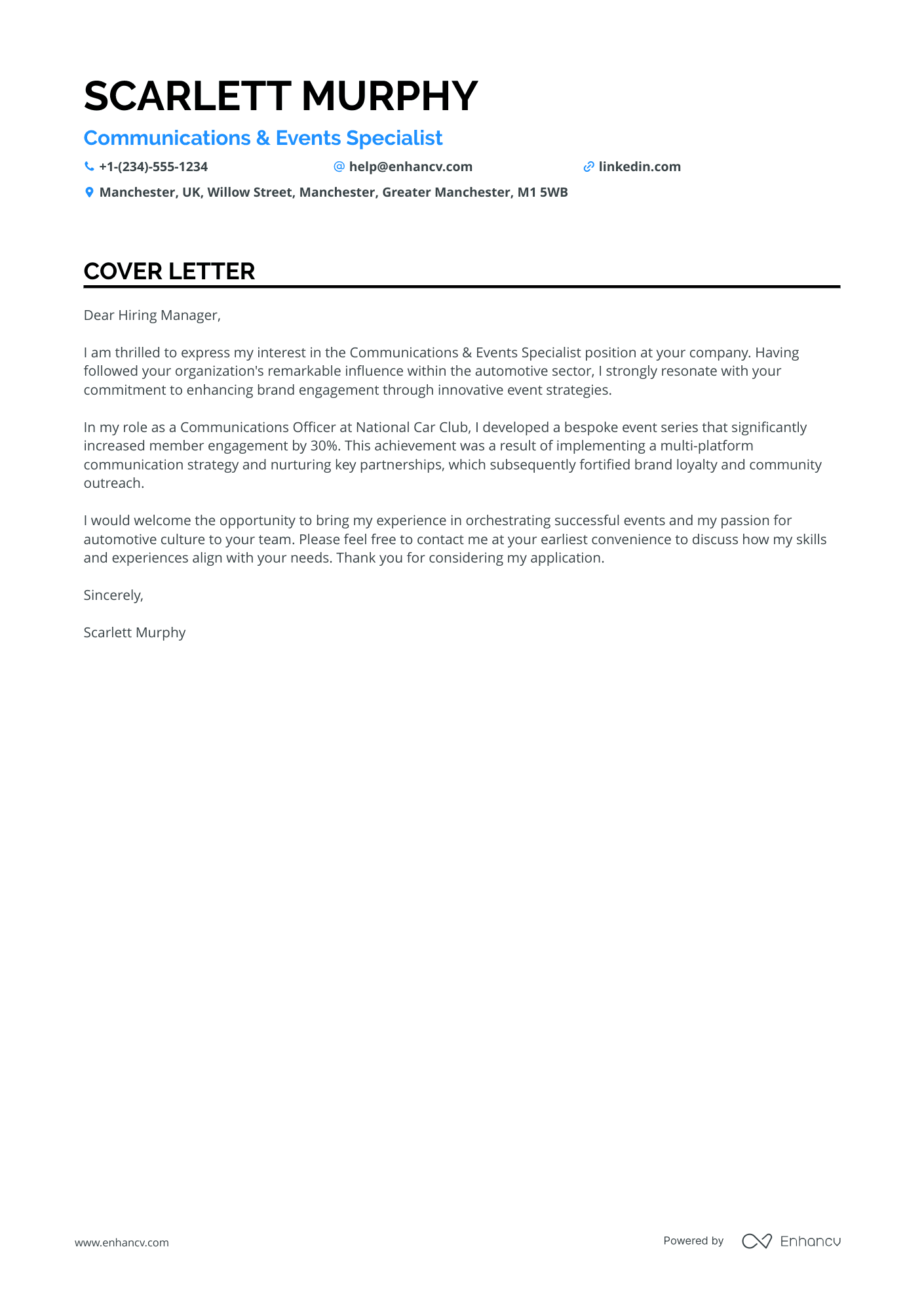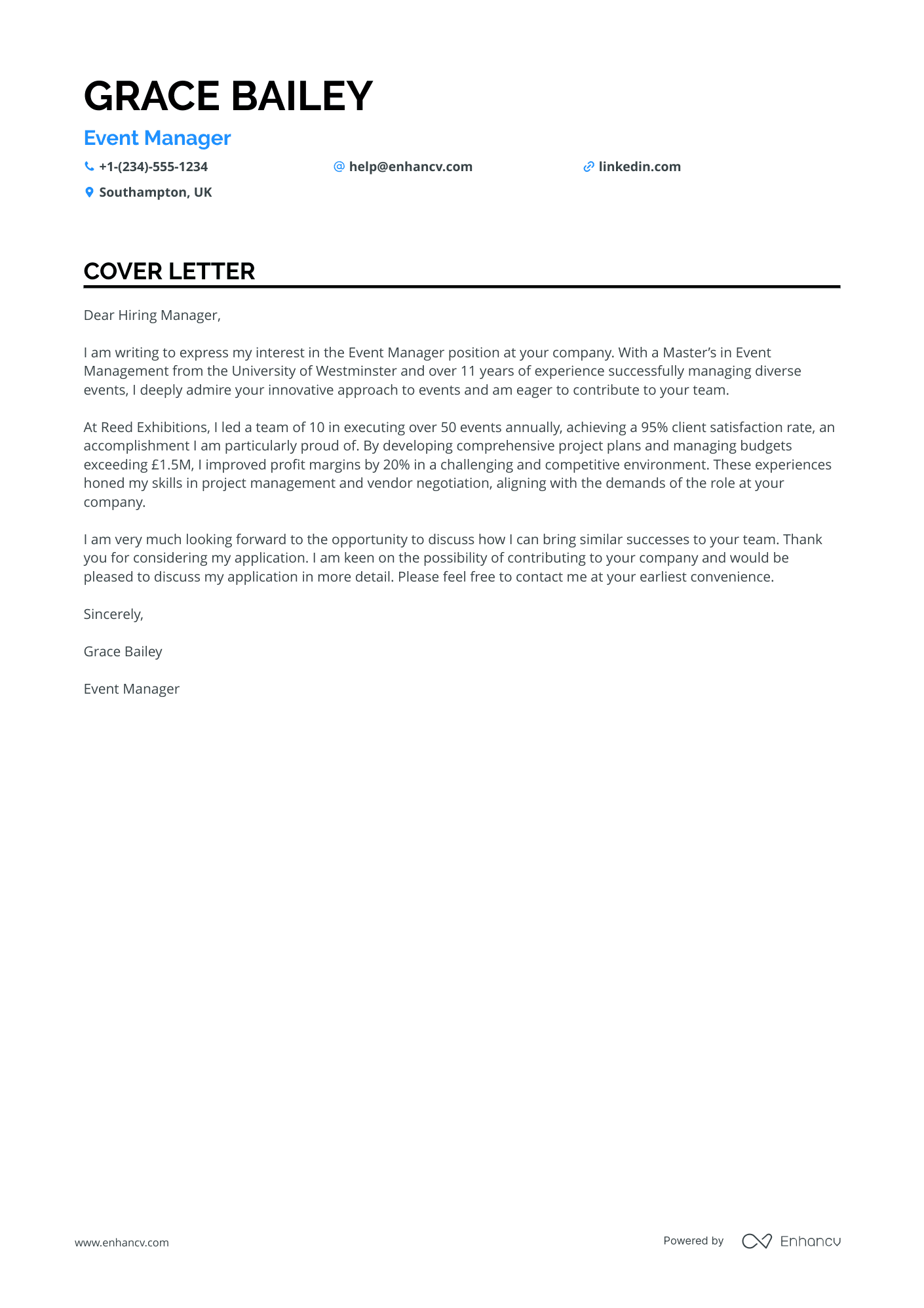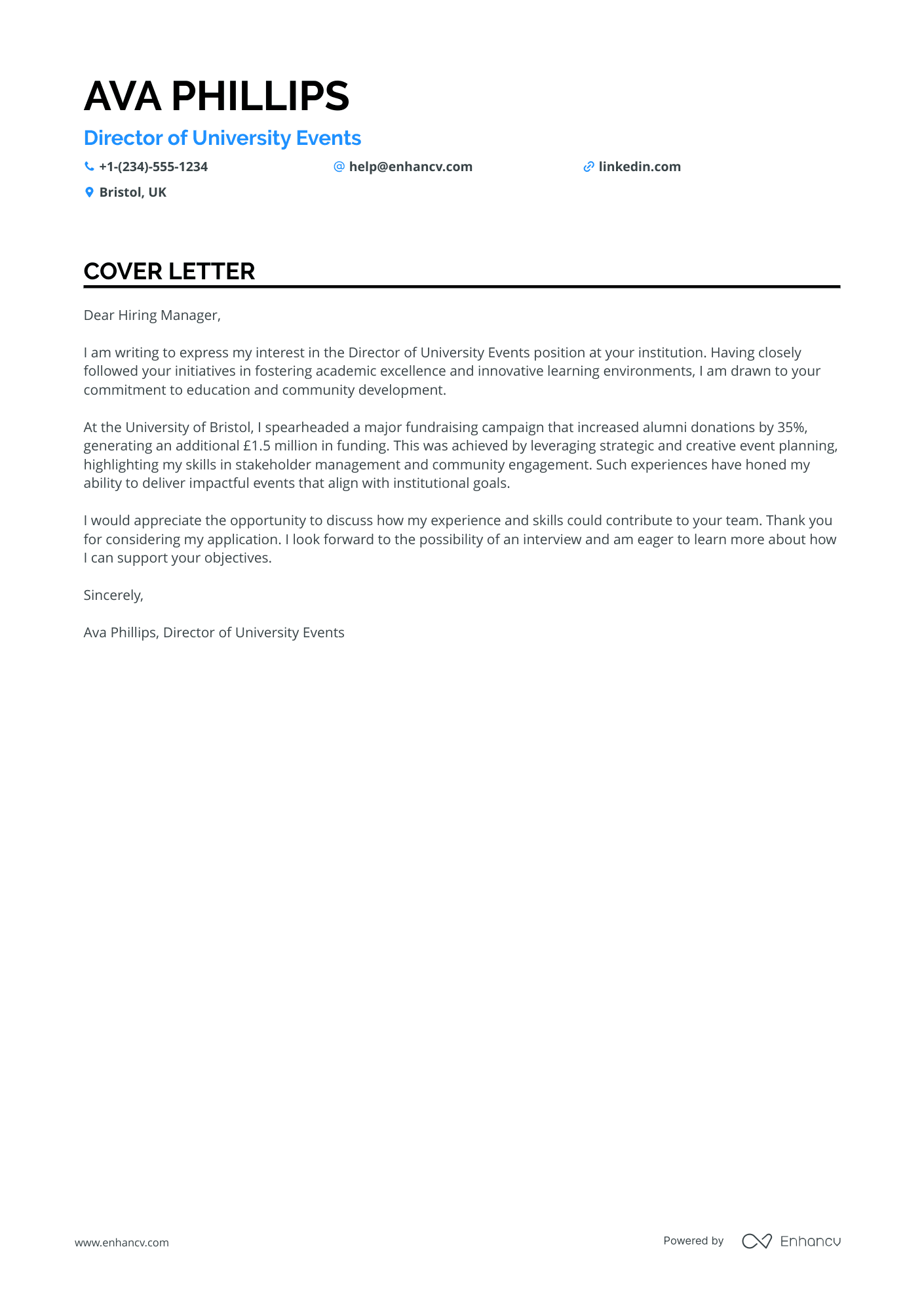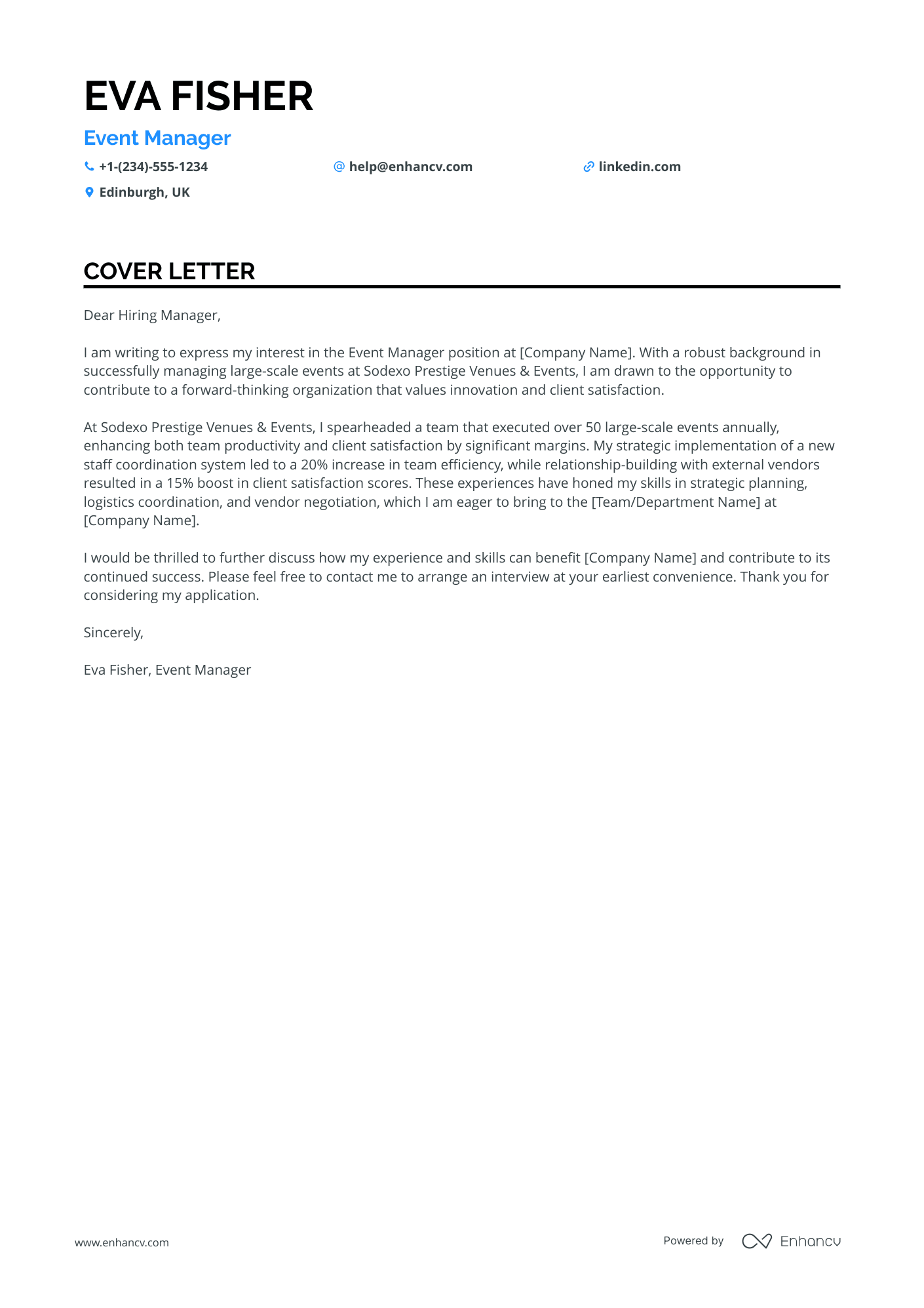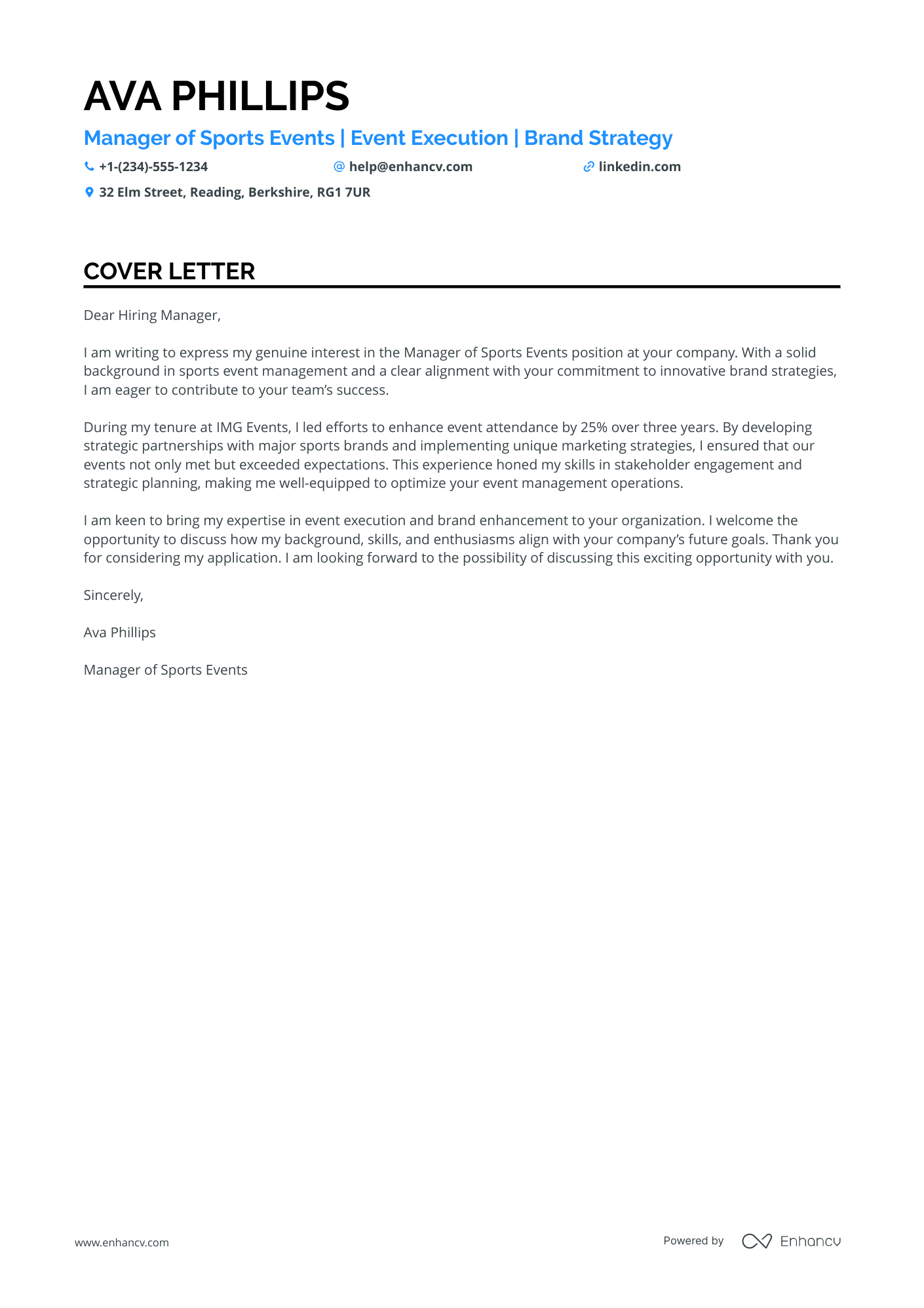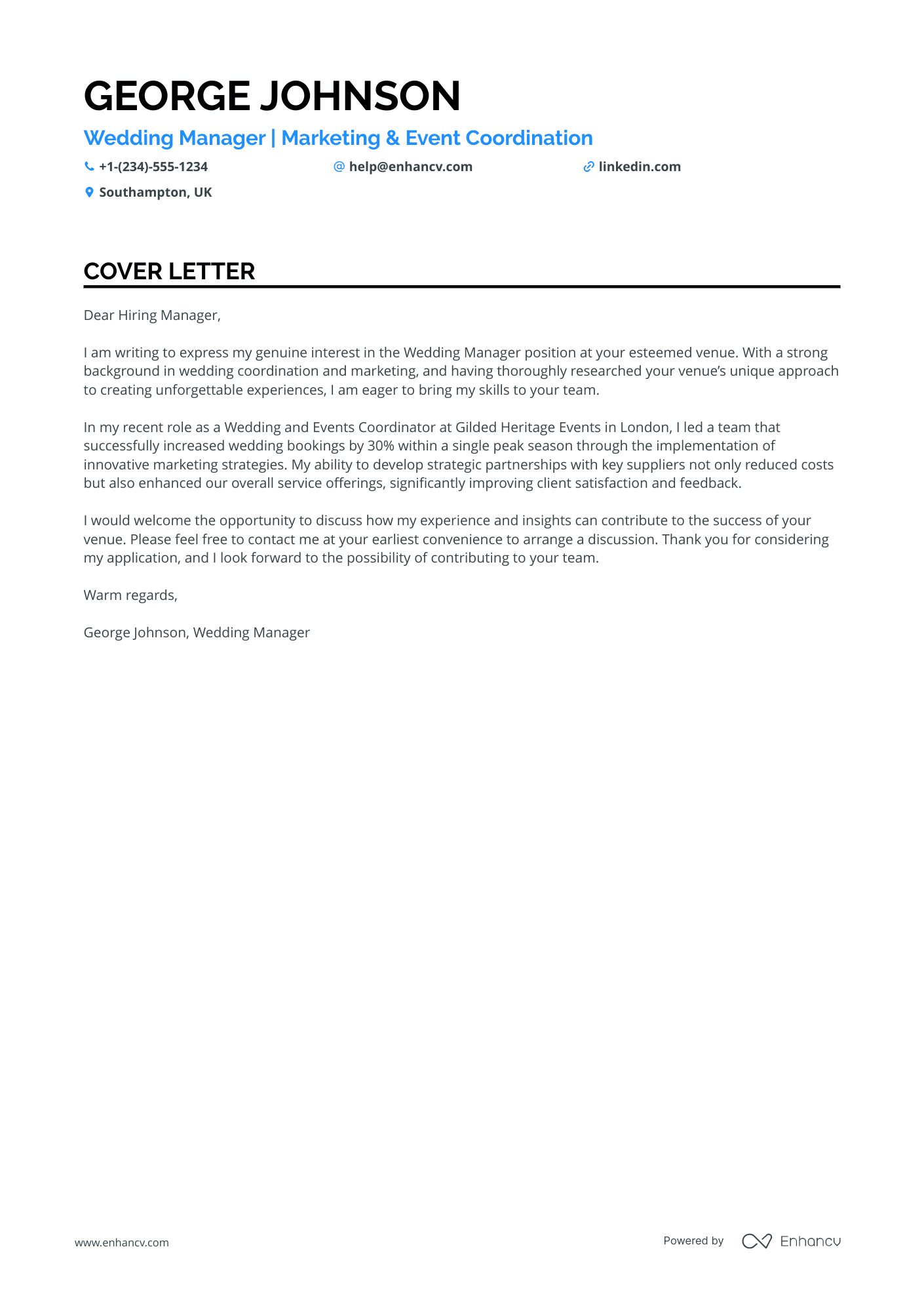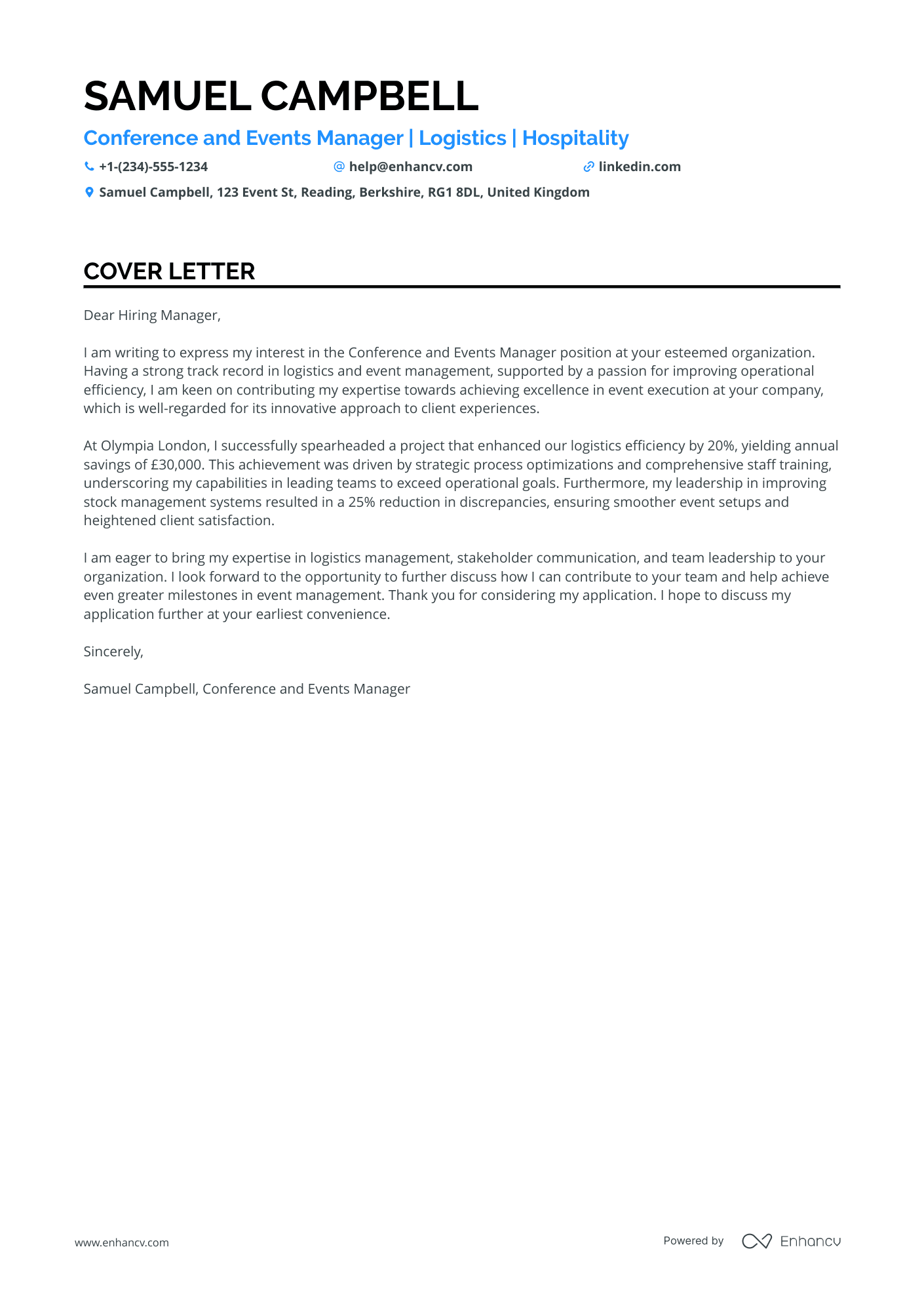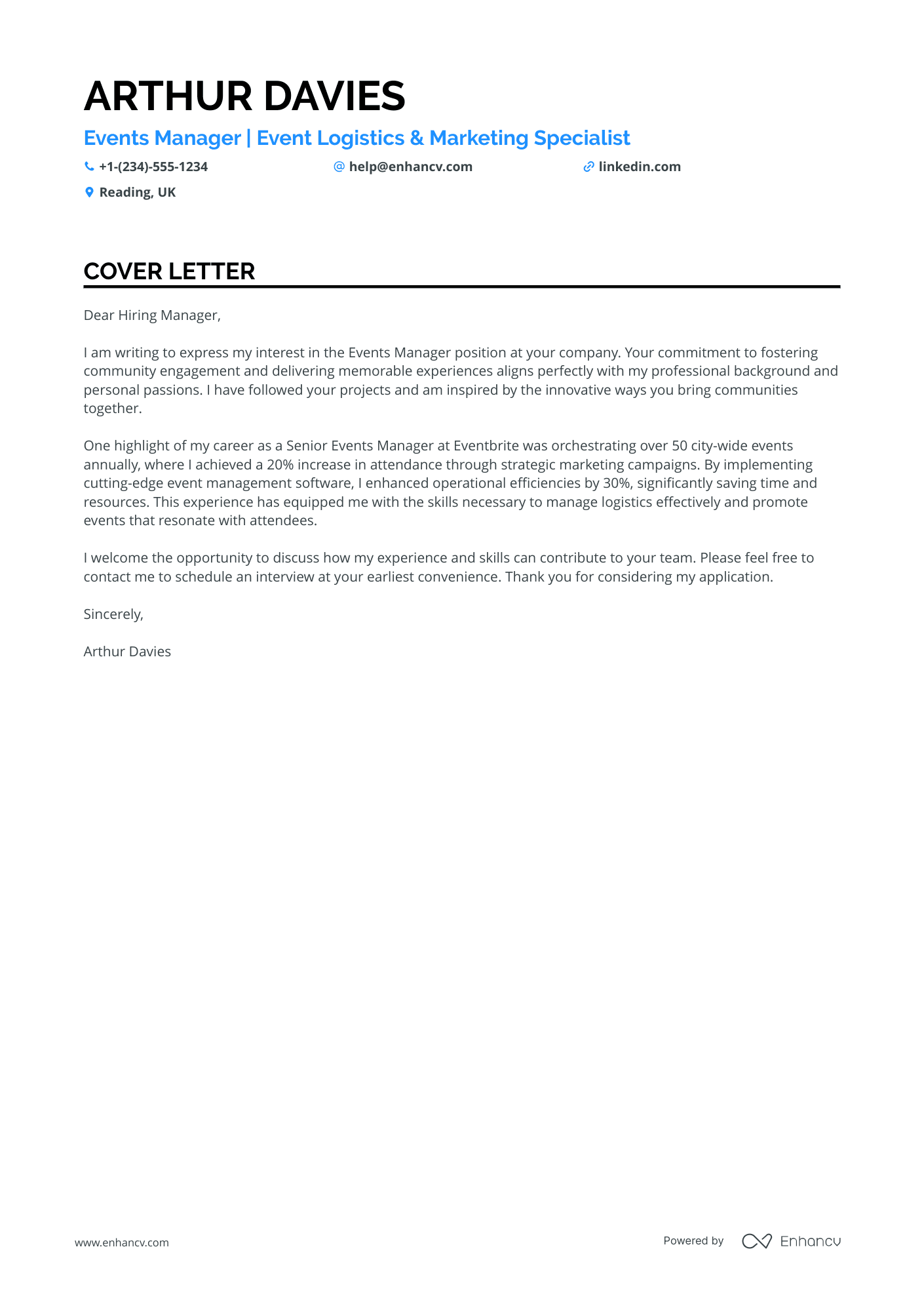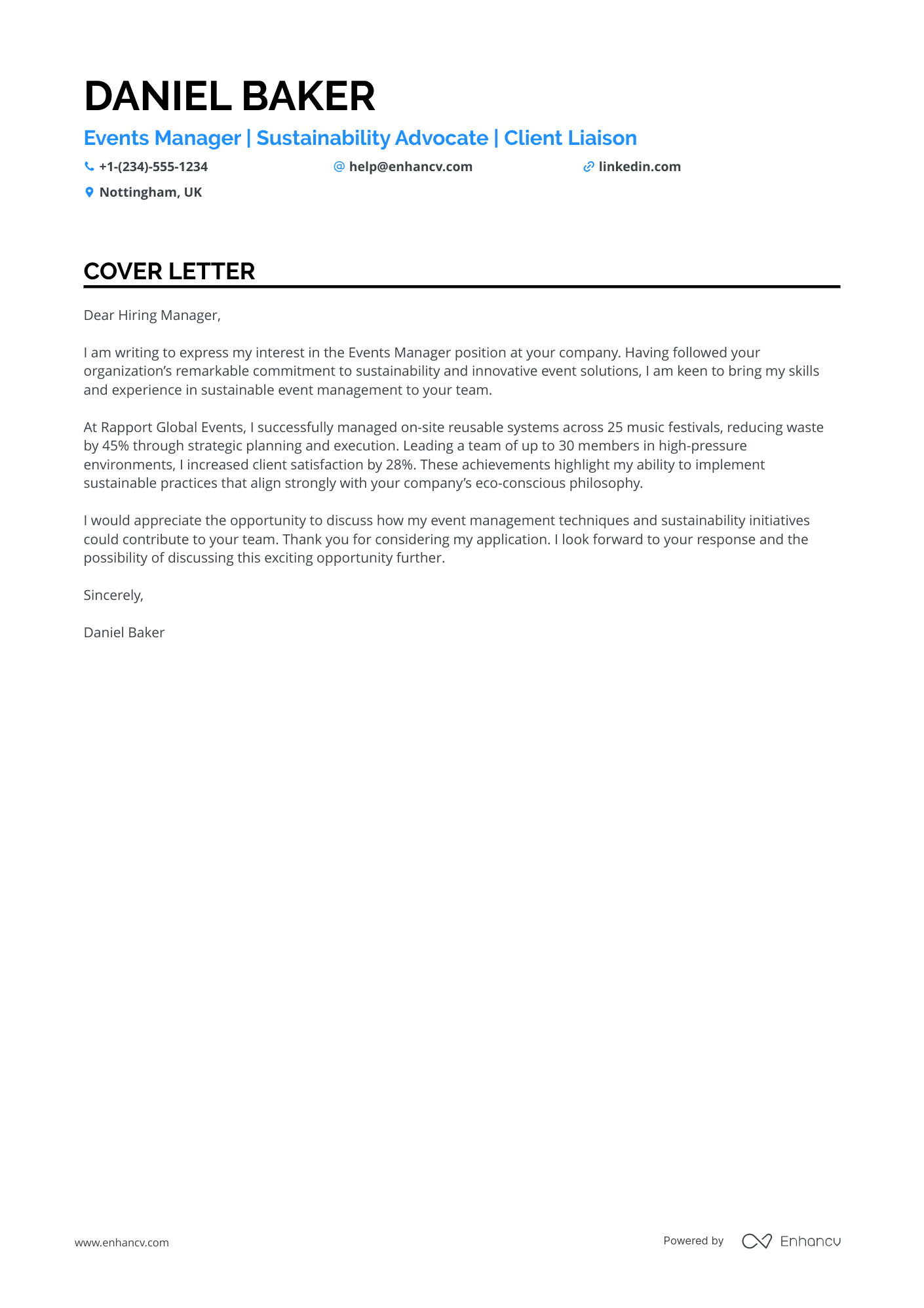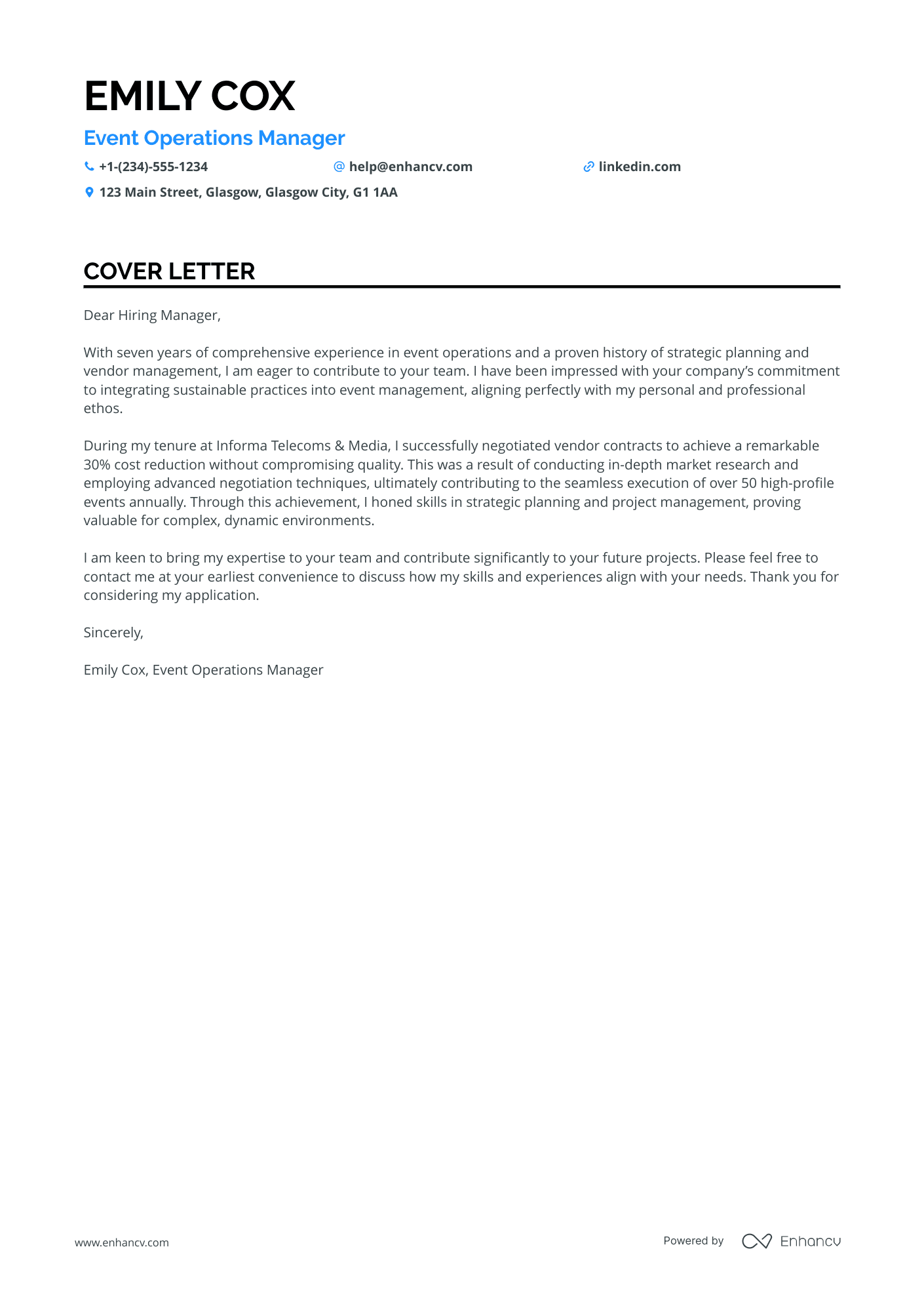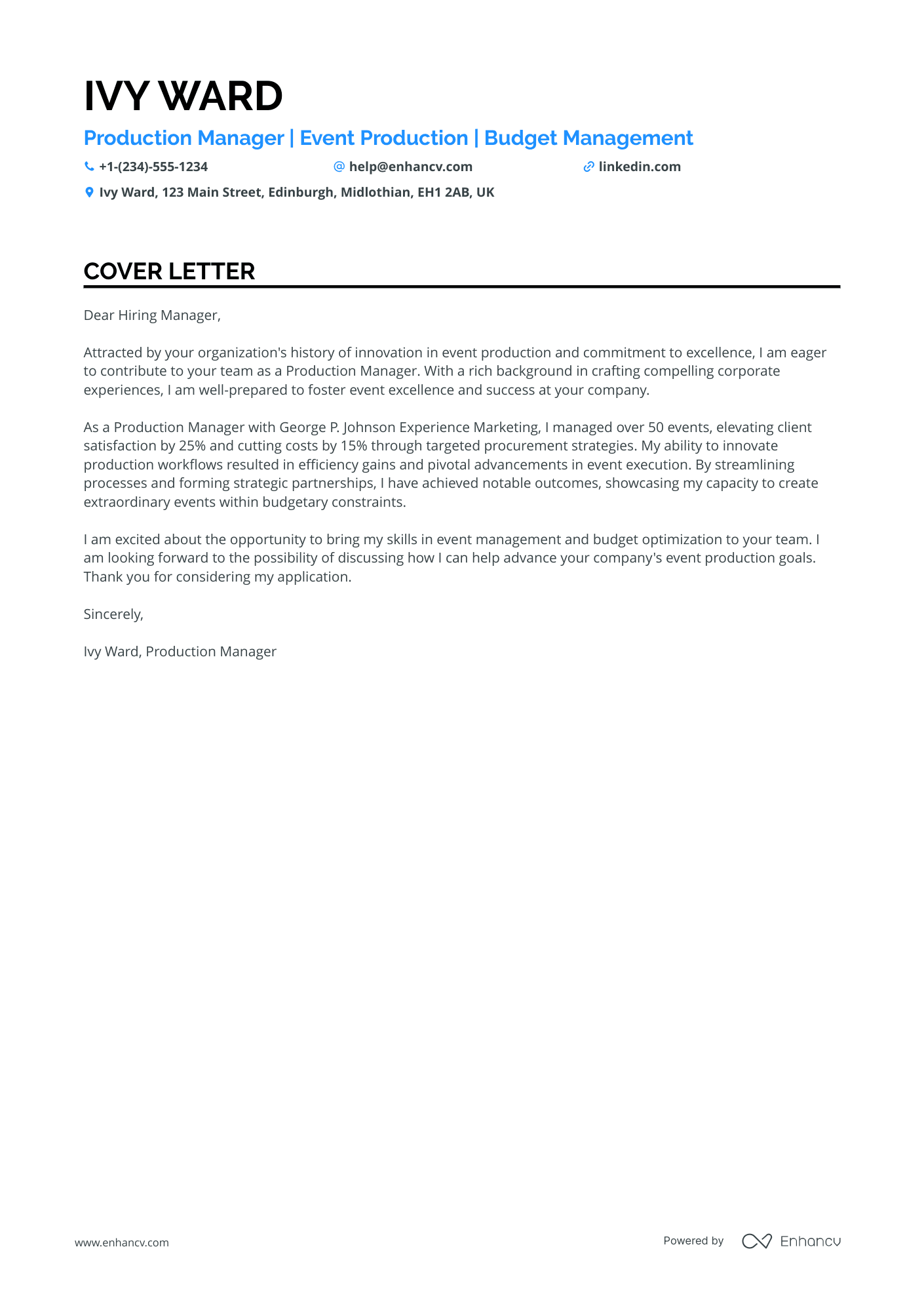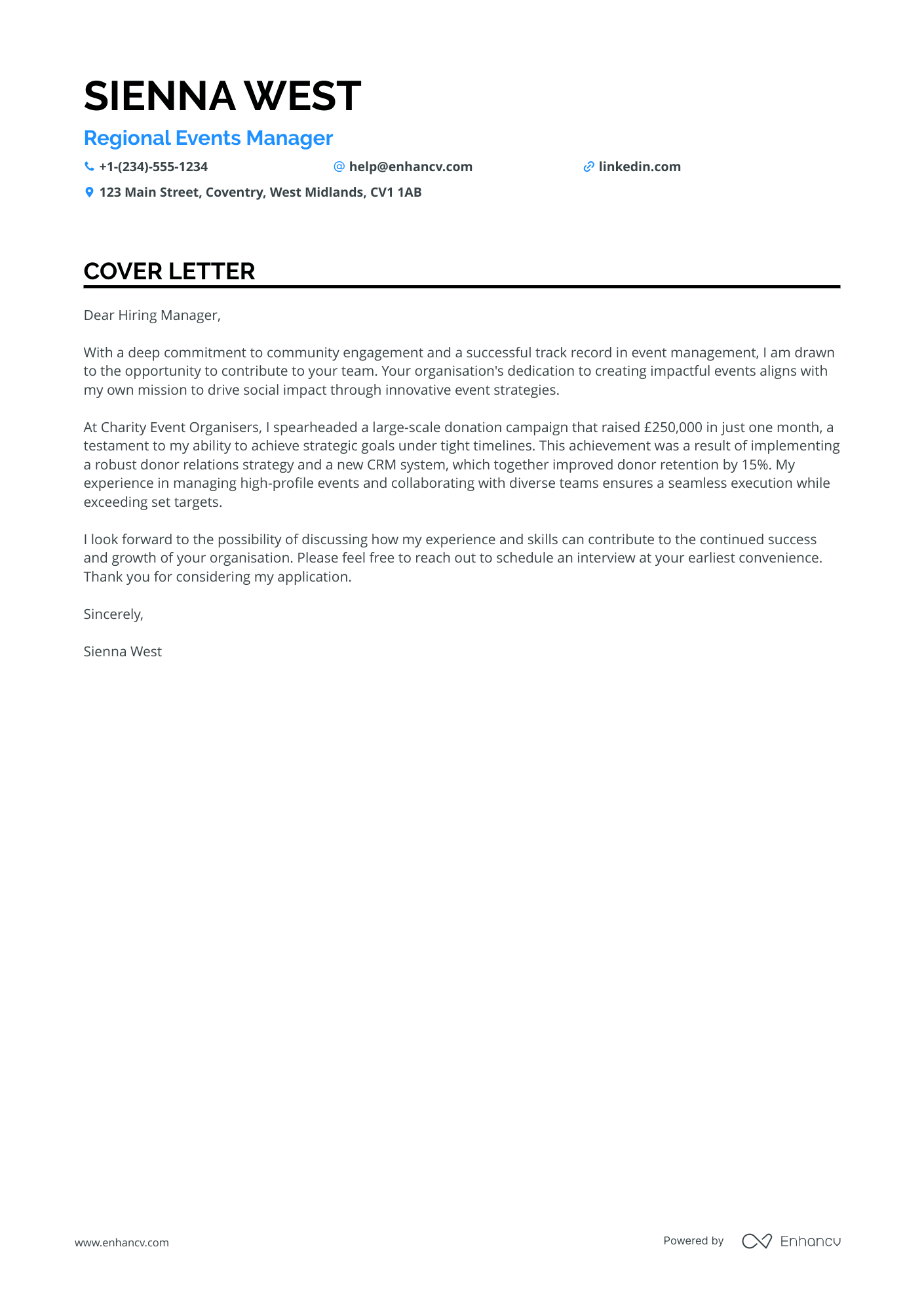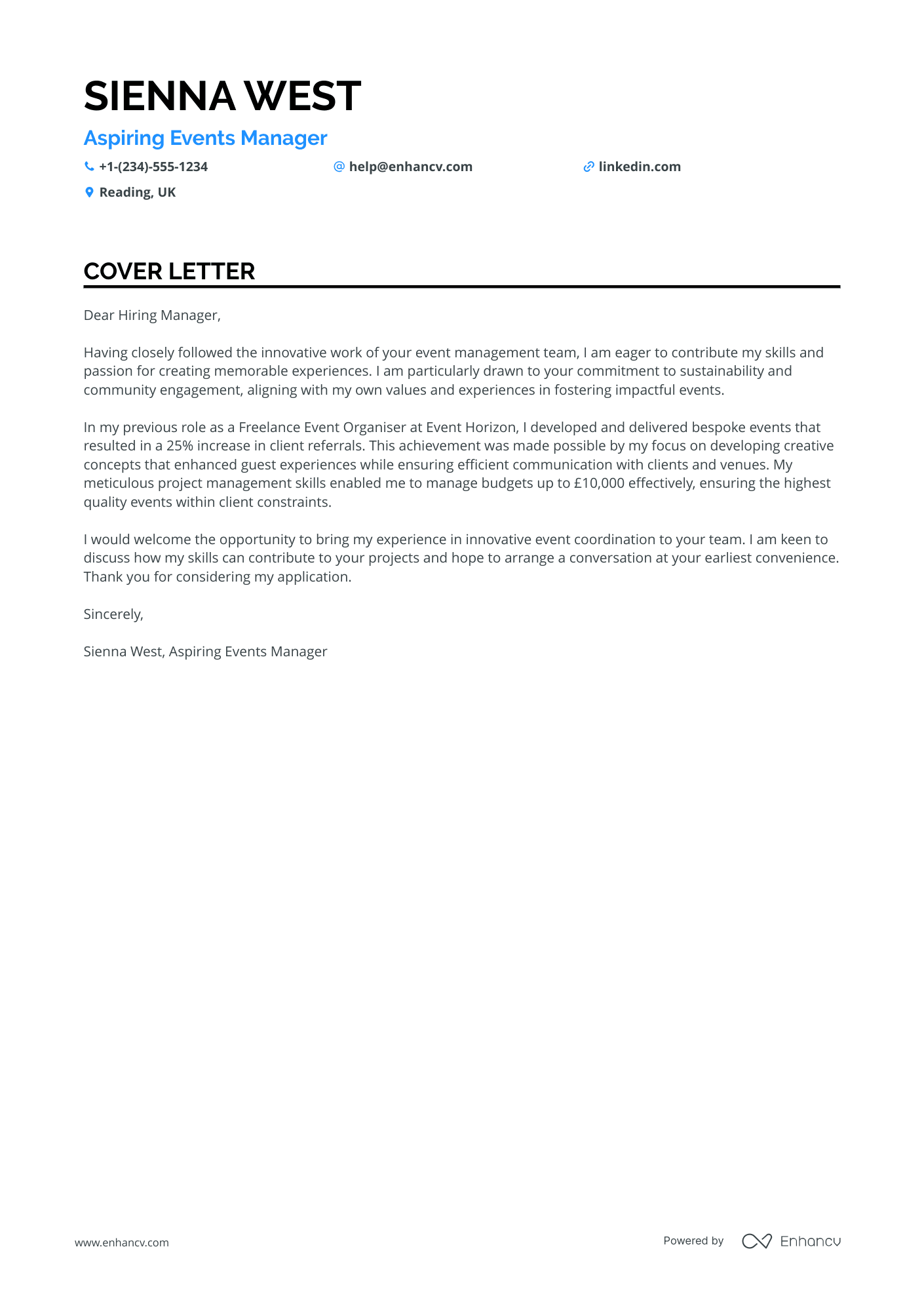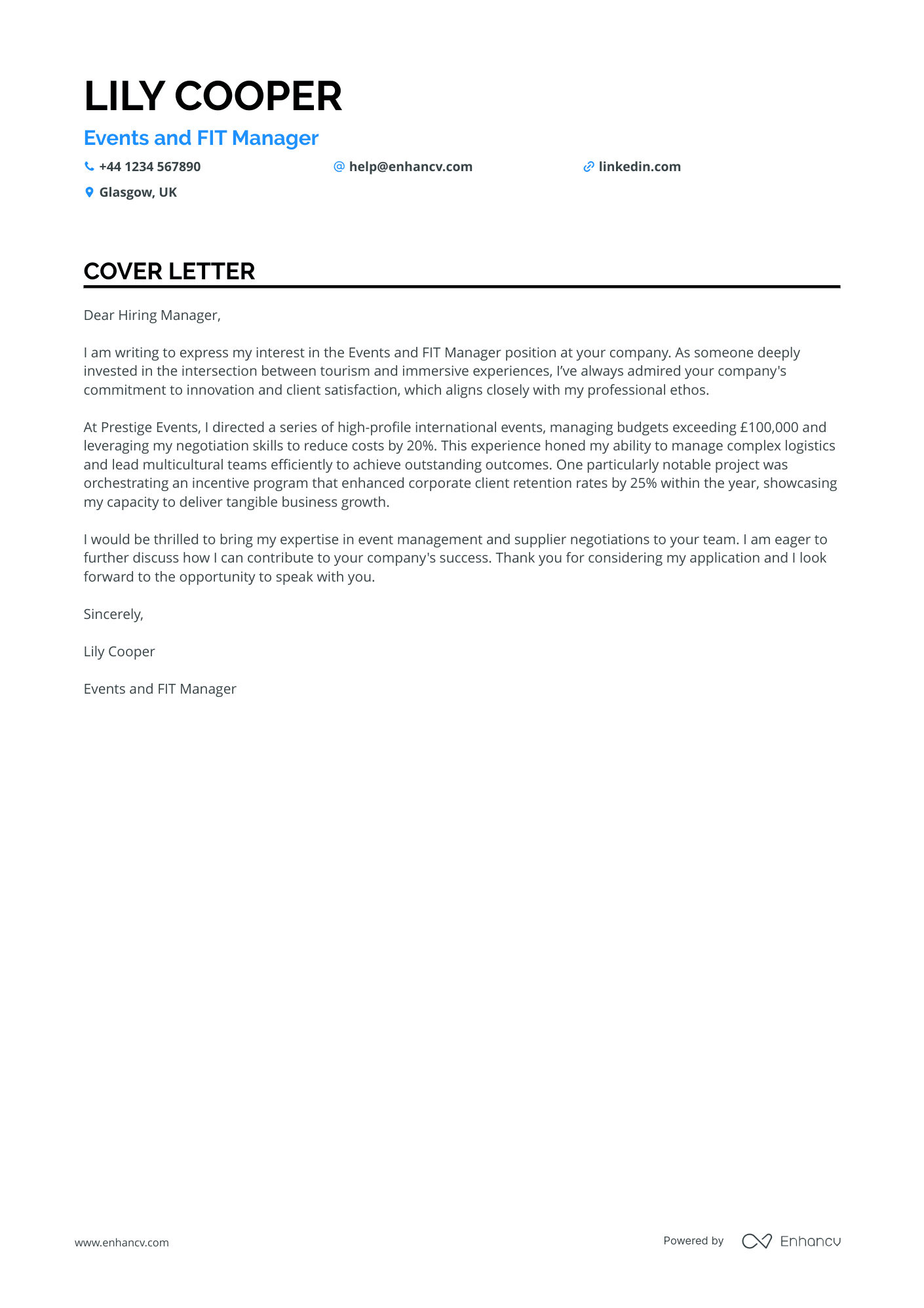Congratulations on completing your first cover letter. However, as you look back, you realise it’s simply a copy-paste of your CV.
Repeating your curriculum vitae is a common pitfall that many candidates encounter, making the cover letter redundant.
Your cover letter should provide fresh insights, adding more value to your application. It’s also the ideal space to address career gaps or major transitions that might not be covered in your CV.
In this guide, you’ll learn how to use your cover letter to demonstrate why you’re the best candidate for the role, while confidently addressing your career history and key achievements.
Cover letter examples for events manager
By Experience
Senior Events Manager
- Mentioning a track record of managing large-scale events with over 4,000 attendees highlights the candidate's capability to handle high-pressure environments typical in senior event management roles.
- Detailing financial acumen through budget management and cost-saving measures aligns with the strategic elements required for high-profile event logistics, demonstrating the ability to manage resources efficiently.
- Emphasising certifications such as the Advanced Event Management Certification from an international body showcases commitment to professional development in a specialised field.
- Highlighting successful collaborations with culinary teams to innovate enhances client satisfaction, which is crucial in roles involving guest relations and event hospitality.
Assistant Events Manager
- Highlight Relevant Experience: The cover letter effectively demonstrates Isla King's considerable experience in event management, showcasing specific achievements such as managing over 150 events annually and improving client satisfaction by 30%.
- Emphasise Leadership Skills: Highlighting team leadership abilities, such as leading a team to achieve a 98% on-time event start-up rate, strengthens Isla's candidature for roles requiring strong managerial skills.
- Mention Certifications and Courses: Citing relevant accreditations like the Advanced Event Management course and Customer Service Excellence certification provides evidence of formal expertise and ongoing commitment to professional development.
- Focus on Quantifiable Achievements: The cover letter effectively utilises quantifiable results, such as reducing preparation time by 15% and client satisfaction rates, to provide concrete evidence of Isla's contribution to previous employers.
Graduate Events Manager
- Emphasise Quantifiable Achievements: The cover letter effectively highlights specific achievements with quantifiable outcomes, such as increasing brand awareness by 30% and client engagement by 25%, demonstrating the candidate's impactful contributions.
- Relevant Experience: The detailed description of past roles, including specific responsibilities and successes in event management, aligns well with the role of an Event Manager, showcasing relevant expertise and experience.
- Skills and Competencies: Key skills like event management, project management, and budget management are strategically mentioned, underlining capabilities essential for a successful career in event management.
- Highlighting Certifications: The inclusion of certifications, such as Digital Marketing Strategy by Google, reinforces the candidate's ongoing dedication to skill enhancement, which is valuable in the evolving field of event management.
Part-time Events Manager
- Emphasising Experience: Demonstrating over 4 years of experience in event management, particularly focusing on increasing event attendance and fostering community partnerships, aligns well with the role and showcases successful past performances.
- Certification Relevance: Highlighting certifications such as "Risk Management in Events" and "Social Media Marketing for Event Planners" underscores expertise in managing event risks and enhancing visibility, which are crucial in the field of event management.
- Addressing Skills: Listing skills like "Event Planning", "Budget Management", and "Community Engagement" directly relate to the key responsibilities of an Event Manager role, reinforcing the candidate’s suitability.
- Achievements and Metrics: Clearly stating achievements such as increasing event attendance by 40% or raising significant funds through strategic efforts provides concrete evidence of capability and impact.
By Role
Corporate Events Manager
- Customised Overview: Tailoring the introduction with a focus on innovation and sustainability aligns directly with the job title and responsibilities.
- Highlighting Key Achievements: The cover letter effectively showcases significant achievements, such as cost savings and enhancing client satisfaction, which are crucial for an Events Manager role.
- Emphasising Skills Relevant to Role: The inclusion of skills like vendor negotiation, logistics coordination, and social media engagement directly speaks to the requirements of efficiently managing corporate events.
- Use of Measurable Outcomes: Citing specific percentages and outcomes, such as increasing attendee engagement via social media by 40%, effectively demonstrates the impact of the applicant's contributions.
Events Project Manager
- Highlighting Relevant Experience: The cover letter emphasizes over 5 years of experience in delivering high-profile events, which is crucial in demonstrating capability and expertise for an Events & Projects Manager role.
- Showcasing Achievements: Mentioning specific achievements like increasing brand visibility by 30% and securing more sponsorships helps to quantify success and show potential employers the impact of past work.
- Emphasising Key Skills: Skills such as budget management, stakeholder engagement, and digital content strategy are critical for this role, making it essential to highlight them prominently.
- Certifications and Continued Learning: Including courses like Advanced Event Management and Health and Safety in Events shows a commitment to continued professional development and staying updated on industry standards and practices.
Marketing and Events Manager
- Highlighting relevant achievements: The cover letter effectively emphasises impactful accomplishments such as increasing event attendance by 30% and enhancing engagement through innovative event technologies.
- Focus on relevant experience: The document showcases Florence's extensive background in event management, strategically listing roles with a clear progression through different organisations and increasing responsibilities.
- Emphasising skills and education: The cover letter details specific skills and certifications, like the Advanced Event Design and Strategy course, demonstrating specialisation in strategic event planning.
- Personalisation through passion: The passions section provides a personal touch, demonstrating a genuine interest in event innovation and photography, aligning personal interests with professional goals.
Digital Events Manager
- Highlighted over 8 years of experience in communications and PR strategies, essential for a Communications & Events Specialist role.
- Specified career accomplishments, such as achieving a 30% increase in event attendance, showcasing the candidate's effectiveness in driving engagement and meeting organisational goals.
- Emphasised effective CRM management by outlining successful system upgrades and improvements in communication dynamics, underscoring relevant expertise for handling client and member relations.
- Incorporated a passion for automotive culture, aligning personal interests with professional aspirations to demonstrate genuine enthusiasm for the industry.
Charity Events Manager
- Highlighting relevant certifications such as the Project Management Professional Certification for project management roles showcases the candidate's commitment to advanced skills and professional development.
- Emphasising key achievements like a 25% increase in average event attendance and a 20% reduction in planning time demonstrates the candidate's capability to deliver impactful results in event management.
- Detailing strong leadership, budget management, and vendor negotiation skills specific to the event industry reinforces the candidate's proficiency in essential tasks required for an Event Manager role.
- Showcasing successes like cultivating client relations that resulted in a 70% client retention rate underscores the candidate's ability to maintain strong-business relationships, which is critical in the hospitality and events sector.
University Events Manager
- Highlight Relevant Experience: The cover letter clearly outlines Ava Phillips’ extensive experience in event management within the higher education sector, providing evidence of her ability to enhance both alumni engagement and community participation.
- Metrics and Achievements: Ava effectively quantifies her successes, such as increasing alumni donations by 35% and boosting student participation by 40%, demonstrating her impact and ability to drive results.
- Leadership and Collaboration: Emphasising her role in leading teams and collaborating with university departments highlights her leadership and stakeholder management skills, essential for a role in event management.
- Skills and Education Alignment: The inclusion of relevant skills like budget management and strategic planning, alongside courses from prestigious institutions, underlines her preparedness and competence for strategic event planning.
Music Festival Events Manager
- Specific Metrics and Achievements: The cover letter effectively uses quantifiable achievements, such as increasing client satisfaction by 15% and increasing team productivity by 20%, which highlight the impact of the applicant's contributions and successes.
- Relevant Certifications: Highlighting the "Certified Meeting Professional (CMP)" certification underscores expertise in meeting management, which is critical for an Event Manager role.
- Diverse Skillset: The applicant underscores their comprehensive skill set, including vendor negotiation, logistics coordination, and safety protocols, which are essential to holistic event management.
- Focus on Passion and Community Engagement: Demonstrating a passion for cultural events and community engagement showcases personal motivation and alignment with roles that value social impact and cultural awareness.
Sports Events Manager
- Emphasise the significance of over five years of expertise in sports event execution and budget management, as it directly pertains to the competencies required for a Manager of Sports Events role.
- Highlight proficiency in English and Spanish, showcasing the ability to communicate and manage events in a bilingual environment, which can be advantageous in diverse multicultural settings.
- Spotlight the achievement of a National Event Planning Award in 2020, which attests to a high level of excellence and innovation in large-scale event management, making the applicant stand out as a distinguished professional.
- Detail the completion of a Sports Marketing Certificate from the Chartered Institute of Marketing, underlining specialised knowledge and strategic thinking in sports marketing, vital for enhancing brand strategies within events.
Wedding Events Manager
- Highlighting Professional Experience: Clearly showcasing a progression in wedding and event coordination roles demonstrates expertise and commitment to the industry.
- Quantifiable Achievements: Including specific metrics, such as a 30% increase in bookings or a 40% increase in engagement, provides solid evidence of capabilities and successes.
- Relevant Skills and Software Proficiency: Mentioning skills like social media management and experience with tools such as Canva and CRM systems highlights technical and industry-specific competencies.
- Educational Background and Continuous Learning: Emphasising academic qualifications such as an MBA alongside relevant courses like 'Digital Marketing Strategy' shows a commitment to continual professional development.
Conference and Exhibition Events Manager
- Emphasise relevant experience: The cover letter highlights Samuel Campbell's extensive experience in logistics, focusing on quantifiable achievements such as improving setup efficiency by 15% and reducing incident reports by 30%, which directly relate to the role's demands.
- Highlight leadership skills: Demonstrating team leadership capabilities is essential for a Conference and Events Manager position. The letter mentions enhancing team satisfaction and productivity, showcasing Samuel's ability to lead and manage a team effectively.
- Showcase accomplishments in efficiency and cost reduction: The letter accentuates impactful initiatives such as the implementation of cost reduction strategies resulting in a 12% reduction in costs, which is crucial in a logistics role focusing on operational efficiency.
- Relevant education and continuous learning: The mention of an MSc in Event Management and specialised courses in event logistics and health and safety indicates a commitment to continuous professional development, vital for staying updated with industry trends and standards.
Cultural Events Manager
- Highlight Relevant Experience: The cover letter effectively showcases over 8 years of experience in event planning, logistics, and marketing, which are crucial for an Events Manager position.
- Emphasise Achievements: It mentions specific achievements, such as increasing attendance by 20% through strategic marketing and managing a significant budget effectively, demonstrating the ability to meet and exceed job expectations.
- Cite Relevant Education and Certifications: The mention of a Master of Arts in Event Management and certification in Advanced Event Planning and Management highlights specialised education and training relevant to the role.
- Showcase Leadership Skills: Describing the management of a team of event coordinators, alongside achieving a high client satisfaction rate, demonstrates leadership and team management skills essential for an Events Manager.
Freelance Events Manager
- Highlighting Relevant Experience: The cover letter effectively outlines over 7 years of expertise in sustainable event management, which is critical for an Events Manager role focused on eco-friendliness.
- Emphasising Key Achievements: Showcasing achievements such as a 30% increase in operational efficiency and a 45% reduction in waste demonstrates impactful contributions in previous roles, appealing to potential employers in the events industry.
- Showcasing Specialised Skills: The inclusion of skills like Sustainability Advocacy, Client Liaison, and Logistic Coordination directly aligned with the desired responsibilities of the position enhances the applicant's suitability.
- Supporting Qualifications with Certifications: Mention of specialised courses, such as 'Sustainable Event Planning', aligns educational background with industry-specific requirements, strengthening the application.
Events Operations Manager
- Highlighting the candidate's experience in achieving a 30% cost reduction demonstrates their expertise in financial management and vendor negotiations, which is crucial for an Event Operations Manager role.
- Mentioning the achievement of a 95% on-time delivery rate for events through strategic project planning shows the candidate's exceptional organisational and time management skills.
- Emphasising the candidate's role in increasing team efficiency by 15% through mentoring programmes underscores their leadership and team development capabilities, vital for managing large projects and teams.
- Including certifications such as "Advanced Negotiation Techniques" from Harvard Business School Online distinguishes the candidate's ability to enhance vendor relationships and procurement strategies.
Events Production Manager
- Highlight specialised certifications: Emphasise certifications such as the "Advanced Technical Production Certification" from the Event Leadership Institute, which shows improved proficiency and efficiency in technical production for events.
- Emphasise budget management skills: Ivy has successfully managed large-scale budgets, delivering comprehensive budgets within a £500,000 range annually, showcasing expertise in budget management critical to a Production Manager role.
- Highlight event execution achievements: Experience in leading cross-functional teams to execute events smoothly, with Ivy managing audiences of up to 5,000 participants, indicates competence and the ability to handle high-pressure situations effectively.
- Showcase client satisfaction improvement: By managing and producing over 50 events that improved client satisfaction ratings by 25%, Ivy demonstrates reliability and effectiveness in enhancing client experiences through excellent event execution.
Regional Events Manager
- Clearly highlights over 5 years of experience in event planning and management, which is crucial for the role of a Regional Events Manager.
- Mentions specific achievements such as spearheading a large-scale donation campaign, demonstrating expertise in fundraising.
- Emphasises skills in multitasking and budget management, aligning with the strategic goals of event planning and execution.
- Includes education and certifications relevant to the events industry, like the Certified Meeting Professional, enhancing credibility in strategic event planning.
International Events Manager
- Relevant Volunteer Experience: The candidate highlights volunteer roles, such as Event Coordinator Volunteer and Community Events Volunteer, which demonstrate hands-on experience in event management.
- Emphasising Skills: Skills like Project Management, Tripleseat, and Microsoft Office 365 are noted, showcasing proficiency in tools essential for effective event management.
- Educational and Course Background: Completing a Bachelor of Arts in Event Management and taking advanced courses, like the Eventbrite course on event planning and Cvent course on digital strategies, align with the role's requirements.
- Achievement Highlights: Mentioning specific achievements, such as successful charity events and budget management, illustrates the candidate's capability to deliver tangible results in similar future projects.
Events Manager cover letter example
Lily Cooper
Glasgow, UK
+44 1234 567890
help@enhancv.com
- Highlighting tangible achievements, such as the reduction of costs by 20% and enhancing client retention rates by 25%, provides concrete evidence of skills and success, making the candidate stand out.
- Mentioning the management of significant budgets (e.g., £100,000) conveys the candidate's capability to handle large-scale projects, which is crucial for the Events and FIT Manager role.
- Emphasizing skills such as negotiation and budgeting demonstrates the candidate's proficiency in core areas critical for the role, assuring the employer of the candidate’s expertise in essential managerial functions.
- Expressing alignment with the company's values and goals—such as innovation and client satisfaction—demonstrates the candidate's genuine interest and fit for the company culture.
Importance of cover letters in the United Kingdom
Cover letters are a crucial part of your application, offering additional details beyond your CV.
Here’s why they’re essential:
- Supporting your CV: Now's your opportunity to provide some context for your experience, with more information on your key achievements and how your profile could benefit the position and organisation to which you're applying.
- Showcases your character: Taking the time to write a cover letter demonstrates that you’re proactive, organised, ambitious, and genuinely interested in the role.
- Reflects your career goals: Use the cover letter to outline your long-term career career aspirations and how this role aligns with your broader plans.
What UK employers expect from a cover letter
Want to make an excellent first impression on your UK employers with your cover letter?
Here are three handy tips and tricks to keep in mind when creating yours:
- Take the time to research: Invest in learning about the company and role by exploring their website, social media, and doing a thorough Google search. Focus on the products and services they offer, as well as awards and industry recognitions.
- Focus on the company's values: Refer back to your research and to uncover what the company believes in. Integrate those values into your cover letter by explaining how you embody them. For example, if they value diligence, highlight how you’ve consistently met tight deadlines or successfully managed heavy workloads.
- Align your skills with the job requirements: Read the job advert carefully and identify the most sought-after skills. Select the top three skills that you can substantiate with your most noteworthy achievements, to demonstrate your expertise in those areas.
How to format a events manager cover letter
Your cover letter is your opportunity to make a strong impression, so its structure must be professional and clear.
Here's an overview of how a UK cover letter should be structured:
- Begin with your address and contact details at the top.
- Include the employer’s name and address directly below.
- Add the date to the left or right of the page.
- Use an appropriate greeting, such as 'Dear Mr Smith' or 'Dear Sir/Madam.'
- Open with a strong introductory paragraph.
- Develop your points in the middle paragraphs, focusing on relevant skills and experience.
- Close with a concise conclusion, reiterating your interest and suitability for the role.
- Sign off formally with your name and signature.
The software used to match your profile to the job, Applicant Tracking Systems (ATS), won’t scan your cover letter. Instead, the cover letter reads as a more personalised note to the recruiter.
When it comes to choosing a font, consider modern options like Lato, Rubik, or Chivo, which should also be applied to your CV to maintain a consistent appearance.
Additionally, your cover letter should be single-spaced with 1-inch (2.5 cm) margins on all sides (our templates are pre-set with these specifications so you can focus on your cover letter content).
Finally, always send your cover letter as a PDF to preserve the formatting and prevent edits.
How to write your events manager cover letter salutation
It's never advisable to begin your cover letter with 'Dear Sir/Madam', as it sounds comes across as impersonal.
Take the time to find out who is hiring for the role and address them directly in your cover letter greeting (e.g., 'Dear Mrs Chanceworth', 'Dear Harrod').
If you're uncertain where to find the hiring manager’s name, check the company website, look on LinkedIn, or send a courteous email requesting this information. Don't hesitate to ring reception either—they are unlikely to refuse to assist.
How to write your events manager cover letter intro
Employers do want someone who not only delivers results but does so with enthusiasm.
Thus, a great way to start your cover letter is by showing how your personal passions align with the role.
Highlight one or two aspects of the job description that resonate with you, and explain why this makes you a perfect fit for the company and its culture.
How to write your events manager cover letter body
Your cover letter body is the most spacious and vital part of this document—it highlights your true value and the impact you can bring as a candidate.
Remember, your cover letter serves a different purpose to your CV. Here, you need to show your skills in context by telling the story of one significant achievement, hinting at how you’ll help your future employer achieve their goals.
So, when writing your cover letter body:
- Use concrete achievements to demonstrate your personality and impact.
- Support your achievements with quantifiable data and metrics.
- Tell the story of a successful project you’ve worked on and explain how you contributed to the outcome.
- Highlight both hard and soft skills to make your story more engaging.
- Focus on skills that are most relevant to the role and align with the company’s needs.
How to write a closing paragraph
Now we’ve reached the closing paragraph of your cover letter. You might be tempted to end with a simple Yours sincerely, but don’t!
Instead, finish with a promise to enhance the company’s performance metrics (backed by your hard and soft skills), to develop as a professional, or something else that holds significance for the organisation. Whatever you choose, ensure to stand behind your words and be remain sincere.
Don’t forget to include a call to action, encouraging recruiters to suggest the best time to follow up for an interview or update.
Conclusion
A standout cover letter is crucial for making an strong impression in your job search in the UK market. Personalise your letter by addressing it to the hiring manager and aligning your skills with the job description.
Use concrete examples to highlight your greatest achievement and convey your enthusiasm for the position. Finally, ensure that both your cover letter and CV are presented professionally for a consistent application.
